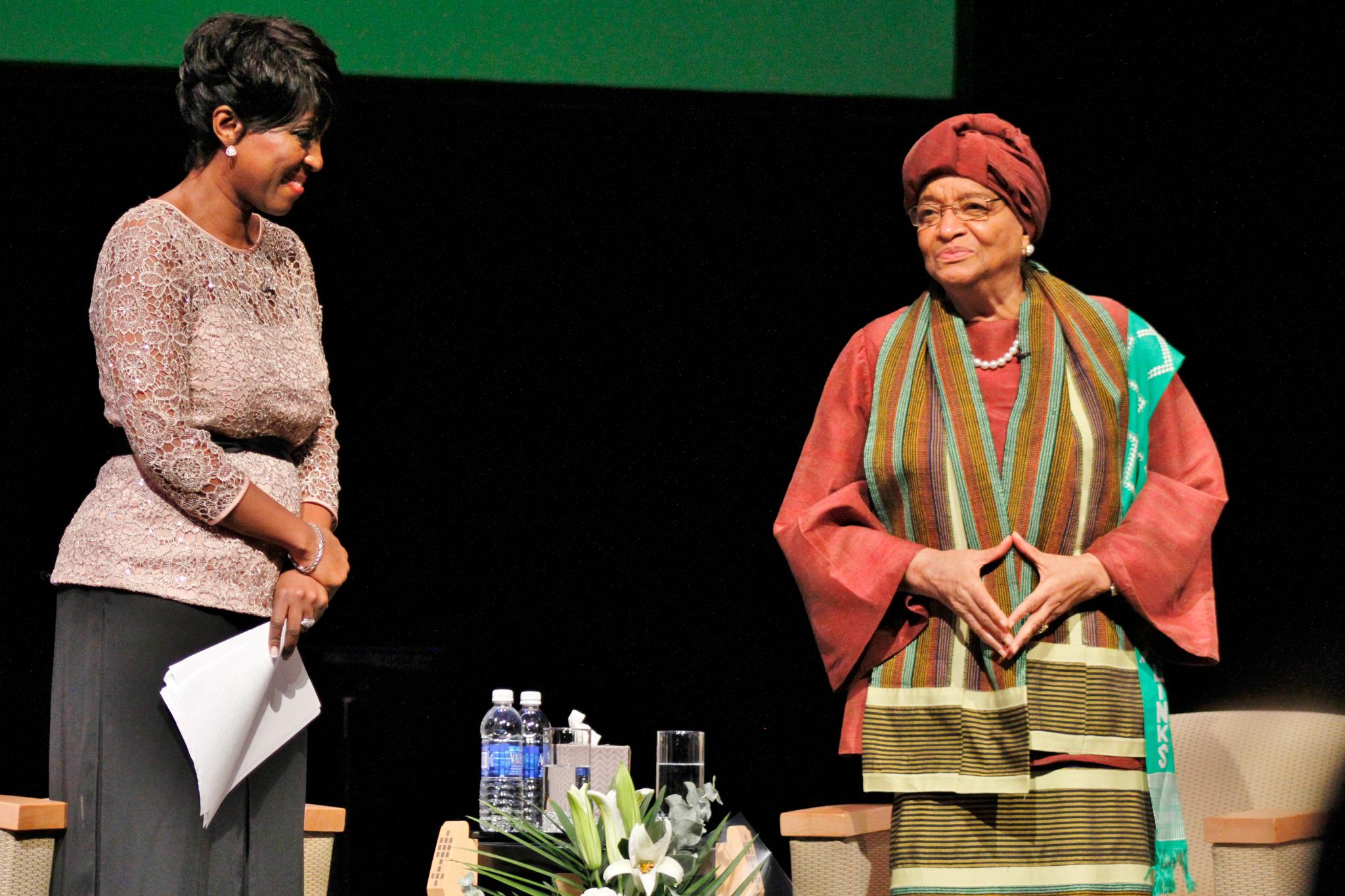
In an exclusive interview Liberian President Ellen Johnson Sirleaf spoke with NY1 anchor and ESSENCE Empowerment Experience Gospel Tribute host Cheryl Wills at York College in Queens, N.Y. for Women’s History Month. Here, the fearless leader breaks down fact and fiction about the deadly disease and its connection to her country.
“If your dreams don’t scare you, then you are not dreaming big enough.” That’s what Liberian President Ellen Johnson Sirleaf famously told the class of 2011 at Harvard University. President Johnson is proud to say that she dreams big … but these days she’s recovering from a living nightmare that enveloped her country: Ebola.
Last summer, the poorly understood virus swept through her nation and left death and chaos in its wake. Liberia, which was founded by former African-American slaves in 1847, became the epicenter of the epidemic, claiming more than 4,000 victims. President Ellen Johnson Sirleaf candidly admits that the rapid outbreak caught her and her administration by surprise. “Horrifying… I was as frightened as everybody else because we didn’t know what to do, and we didn’t know how to respond,” Sirleaf said during an interview at York College in New York City. “It was a strange unknown enemy.”
For more than a generation, Liberia had lurched from one crisis after another as political unrest devastated the small nation on the West Coast of Africa. After her historic election in 2006, which made her the first democratically elected woman President in Africa’s history, she helped stabilize Liberia and was notably awarded the Nobel Peace Prize in 2013. But within months of that incredible honor, the Ebola virus threatened to undo all of her hard work.
As Liberians from all walks of life were succumbing to the virus, President Sirleaf sent letters of warming to world leaders and regrets that the global response was “slow.”
“I had written the President, Britain all of them, and I tried to tell them that this was not a threat to Liberia, this was not a threat to West African, and if they did not respond, chances are there would be people crossing borders going into other countries. And indeed, it did happen.”
The world finally took notice in September 2014 when 42-year-old Thomas Eric Duncan, a Liberian national, flew to Texas and days later was diagnosed with Ebola. Before he died on October 4th, he had infected two nurses, who were isolated and successfully treated. Weeks later, New York City physician Dr. Craig Spencer was infected after returning from volunteering with Doctors Without Borders in Guinea.
President Sirleaf, who is no stranger to criticism and was imprisoned and threatened with execution for speaking against corrupt leaders in Liberia, readily admits that she and her administration were harshly criticized for their inadequate response.
“The population got disgruntled, there was discontent, they expected us to have the answer to respond, but we could not at that time.”
But time was not on her side. President Sirleaf says Liberia’s entire healthcare system was overwhelmed and only had two ambulances. Doctors and nurses were afraid to work, and those who were courageous enough to help were infected and quickly killed by the Ebola. As the death toll mounted, President Sirleaf says she finally convinced world leaders to step in during an emergency conference call with President Obama and UN Secretary General Ban Ki Moon.
“I took charge of the presidential task force, I took responsibility for this,” Sirleaf says. But she concedes that mistakes were made early on. “At first we made some errors because we wanted to stop the transmission. We took a military and we stopped people from crossing the borders by putting soldiers around the closed borders.”
That move led to skirmishes with police and became a political nightmare. But President Sirleaf, who is 76 and in her second term in office, says she mobilized the Liberian community to save itself.
“We organized our churches, mosques, faith centers,” Sirleaf says. “They prayed, but more than pray, they taught their parishioners and congregation about preventive measure. We enlisted youth leaders and women leaders to take responsibility and take charge, and we gave them the means to be able to go from house to house. That was the right thing to do. That changed this. It made people a part of the solution and that worked.”
It was so effective that on February 27th, President Obama invited the Harvard educated leader to The Oval Office to praise her leadership during the Ebola Crisis. In early March, the last person in Liberia infected with Ebola was cured. If there are no new cases by April 16th, Liberia will officially be declared Ebola-free. The 24th President of Liberia says she is humbled by crisis and learned many lessons. But most importantly, she learned that she still has that fighting spirit.
“I guess when I’m faced with challenges of this nature, it brings out the best in me, the strongest in me, my determination to succeed, not to let something beat me. Not to let something destroy me. It just brings out the strength.”